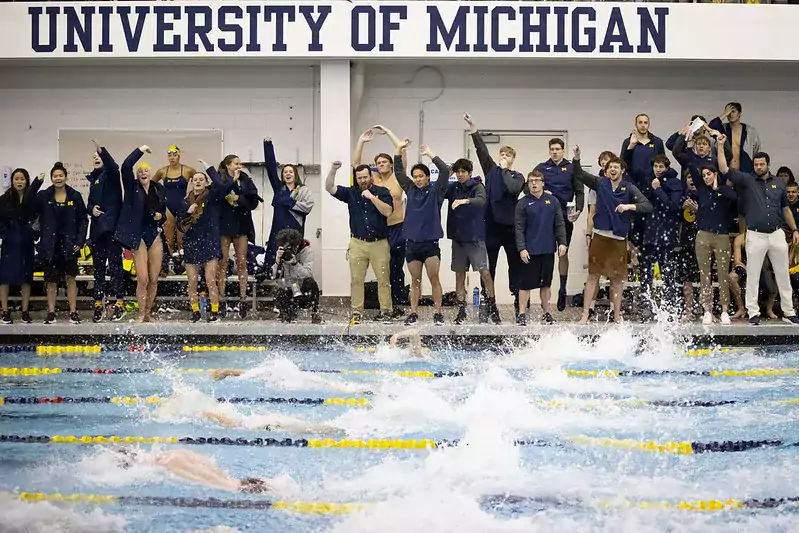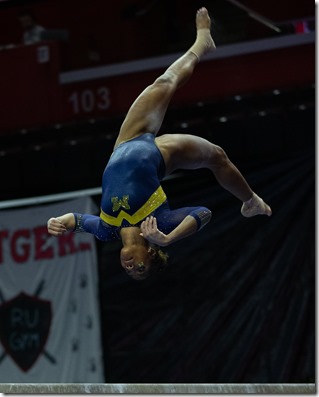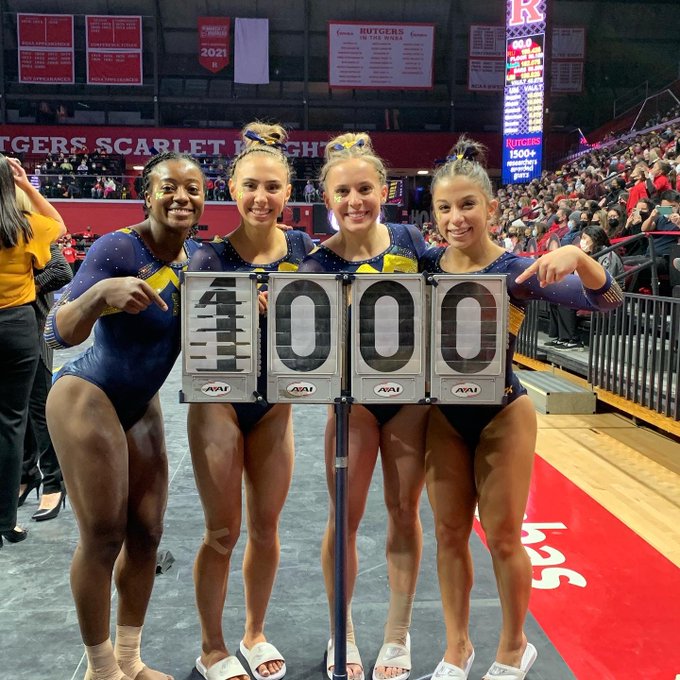women's gymnastics

A few weeks back I did a non-revenue sports piece looking at the fall disciplines, how Michigan's teams fared and who the most decorated athletes in the various sports were. Today we're doing the same, except for the winter sports. A future spring sports edition will be coming in the future and it will be longer than this one, as there are only five sports to cover today: men's and women's swim/dive, men's and women's gymnastics, and wrestling. I've written up summaries for both swim and dives as well as wrestling, while I've enlisted the help of MGoBlog gymnastics correspondent BiSB to cover those two, since he knows a hell of a lot more about it than me.
Wrestling
Michigan Wrestling capped off a solid season at the NCAA Championships back in mid-March, unable to secure a second-consecutive B1G Tournament title, but there's no shame when you compete in a conference as difficult as the B1G. The team went 11-4 in their head-to-head matches, 5-3 in the conference which was tied for fifth with Minnesota and Northwestern. Penn State were kings of the league this year, a perfect 8-0 in conference and winning the national championship. Along the way, the Nittany Lions won the B1G Tournament, which was held at Crisler Center in Ann Arbor this year, where the Wolverines placed fifth. In a sign of the B1G's dominance, Michigan finished sixth in the national championships in Tulsa, behind PSU, Iowa, Cornell, OSU, and Missouri. They were unable to match last season's second-place national finish, but even taking sixth is a sign of the program's strength all the same, not to mention the individual accolades the season produced, which give Wolverine wrestling fans lots to be proud of.
Speaking of those individual accolades, let's talk about Mason Parris. The fifth-year senior became Michigan's 24th individual national champion when he secured the NCAA heavyweight title in Tulsa and the program's first ever winner of the Dan Hodge Trophy, awarded to America's best collegiate wrestler. Parris' national title capped off an immaculate 33-0 season, the capstone to what was already an illustrious collegiate career. Parris began back in 2018-19 as a freshman, 7th in the B1G that season in the heavyweight class, qualifying for the NCAAs. He was already a captain by his sophomore season in 2019-20 and took 2nd in the B1G, before the year ended early due to COVID.

[UMich Athletics]
2020-21 was Parris' first NCAA All-American campaign, where he was the national runner-up for the heavyweight title, but his senior season was marred by injury in the back-half, robbing him of the chance to win it all. He was still named an All-American again, but Parris wanted to return to school to finally take the national title. He got the clean bill of health necessary and dominated this entire season, culminating in the championship match against Penn State's Greg Kerkvliet, which Parris won to take the title. Word is that this may not be the last we see of Parris: in an interview with Rivals' Josh Henschke, Parris revealed that he plans to train for the 2024 Summer Olympics in Paris (would be fun for puns!) and the Michigan Daily reported after the championships that Parris will stay in Ann Arbor over the summer to continue training for the Olympics. Considering that Parris was the runner-up at the NCAAs in 2021 to a future Olympic gold medalist in the Tokyo games (Gable Steveson), making Team USA for Paris seems attainable.
Beyond the greatness of Parris, Michigan had two more All-Americans at the NCAAs. Cameron Amine took fourth in the 165 lb. weight class, earning All-America honors, which is the third time he's earned that distinction in his collegiate wrestling career. Will Lewan was seventh in the 157 lb. class, also his third All-America honor. Lewan, like Parris, is a fifth-year senior who will depart the program, but Amine has two more years eligibility remaining with his COVID-shirt and a red-shirt applying. Sean Bormet leads a strong program, competing in the toughest conference in college wrestling, and though some key wrestlers will be graduating, there is every reason to believe that Michigan will remain competitive in the years to come.
[AFTER THE JUMP: Aquatics and gymnastics]

Essentials
OVERVIEW
So your fingernails were starting to grow back after the Frozen Four, eh? Well that’s a shame. Because here we go again.
The reigning National Champions return to the site of their previous triumph, the Dickies Arena in Fort Worth, Texas. But this time they will be facing a fully weaponized Florida with a healthy Trinity Thomas, a rejuvenated Oklahoma juggernaut, a team that has never not been to Nationals, and the reigning Olympic All-Around Champion.
Yeah.
THE BASICS
The eight teams will compete in a pair of four team semi-final sessions today. The top two teams from each session will advance to Saturday’s final, regardless of whether Team #3 in one session has a better score than Team #2 in the other session. Scores are wiped clean between today and Saturday, so everyone starts fresh. A classic “survive and advance” scenario.
To review: each team performs six routines on each of the four events (vault, bars, beam, and floor). Six judges score every routine, with the high and low score being thrown out and the remaining scores averaged to give the score for that routine. The lowest of each team’s six scores on each event is dropped, with the remaining five scores being added together for an event score out of 50 points. The four events are combined for a total team score out of a possible 200 points.
For those of us who do words more than numbers, and for whom math is a scary place, here’s a shorthand: the winning score will almost certainly be slightly north of 198.000, meaning that keeping pace will require about a 49.500 on each event. That’s an average score of 9.900 for every routine. Stay above that line, and everyone is happy. A team rotation score below about 49.200 is problematic. A team that has to count a fall on an event (meaning they have two athletes fall, forcing them to use one of those two scores) is in deep trouble on today, and is dead in the water on Saturday.

When Last We Saw Them
This will live inside Crisler Center forever and wow does it look beautiful #GoBlue 〽️ pic.twitter.com/7E2dJKwaTY
— Michigan Women’s Gymnastics (@UMichWGym) January 15, 2022
Pretty, pretty good.
Michigan’s women’s gymnastics team, the hegemonic leader of the Big Ten for three decades, finally broke through for their first national championship in program history in April. Michigan was not the favorite heading into the Finals, but they defeated defending champion Oklahoma by less than a tenth of a point on the strength of a program record score of 198.250. The competition came down to the last routine of the entire season, with Abby Heiskell bringing home the hardware.
The title represented the culmination of a dominant home stretch of the season, in which Michigan led wire-to-wire from the second rotation of the Regional Semi-Finals all the way through Regional Finals, National Semi-Finals, and eventually National Finals. They put up program record scores four times in the final six weeks of the season, winning another Big Ten regular season title along the way. Inside Gymnastics Magazine did a fantastic video recap of the 2021 season which I highly recommend.
Chalk Monster
Amidst all of the very loud goings-on with the football team and the men’s and women’s basketball teams, Michigan’s only defending national champion has quietly gone about assembling a juggernaut. A flipping, spinning, toe-pointing Kaiju. Instead of resting on their laurels, Michigan women’s gymnastics chose violence. Graceful, well-choreographed violence, to be sure… but violence nonetheless.
As a warmup act, they opened the season with a win over traditional national power Georgia with a fantastic score of 197.750*, a score only six other teams in the country have put up at any point this season. Having knocked any tiny bits of rust off, they jumped straight into as fine a streak of four meets as you’ll find. They scored a 197.95 in a win over Arizona State, 198.025 in a road win over Minnesota, 197.925 in a win over Michigan State, and 198.525 in a defenestration of Rutgers. For comparison purposes, Michigan hadn’t eclipsed 198.000 in its entire program history until this past March. Only Oklahoma, Florida, and LSU have put up team totals equal to the lowest of those four scores this season, and those three teams have combined for 13 of the 16 champions and runners-up over the last 8 seasons. Michigan is swimming with the big fish this season, and is, as the youths say, stunting on ‘em.
The Rutgers meet was particularly eye-opening. Michigan’s 198.525 is the highest score in the country this season by 0.275 points, and was the sixth-highest score in NCAA history. Not Michigan history, mind you, but NCAA history. Their vault score of 49.875 was the second highest in NCAA history, with Reyna Guggino, Natalie Wojcik, and Abby Heiskell leading off the rotation with three straight perfect 10.0s (followed by a 9.975 by Naomi Morrison that absolutely should have been a 10.0 as well). Overall, Michigan put up four perfect 10s on the evening, with Gabby Wilson grabbing one on floor to go along with the three on vaults.
[Oprah voice] YOU get a 10.0… YOU get a 10.0… EVERYBODY gets a 10.0…
This past Sunday, Michigan rested some athletes and tallied a pedestrian score (by their newfound standards) of 197.600, which would still be enough for a #3 ranking nationally if Michigan put that number up every week.
Michigan is currently ranked #1 nationally with an average of 197.963, leading second-place Florida by 0.325 points. They’re ranked #1 on vault and floor, #2 on bars, and #5 on beam. Individually, Michigan has 2 athletes in the top 10 in the All Around**, 4 of the top 11 on vault, the #2 athlete on bars, 2 of the top 10 on beam, and 3 of the top 10 on floor. Vegas currently has Michigan as the betting favorite to repeat as champions… or at least they would if they put out lines on such things.
*For those unfamiliar with college gymnastics scoring, each team performs six routines on each of the four events (vault, bars, beam, and floor). The lowest of the six scores score on each event is dropped, with the remaining 20 scores being added together for a total team score out of a possible 200 points. The easiest way to think about team scores is “how far away from 50 points was this rotation score” and “how far from 200 points was the total score.” So winning 198.000-197.000 is actually a very healthy margin despite being a ‘one point win’, as it means racking up 33% fewer deductions.
**All Around isn’t a separate competition, but is rather a composite score for individuals who compete all four events in a given meet. Only meets in which an athlete competes on all four events counts towards these standings.




14